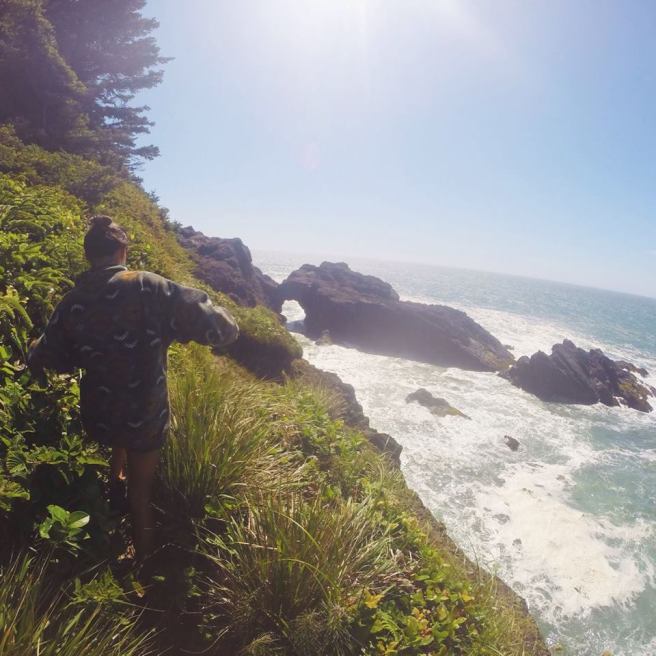
The wind is warm and gentle, and the leaves of an overhead tree rustle while college students chatter and study. Caje cafe at 5:49pm on a Wednesday bursts with young energy and new ideas. Angela Shields sits at one of the outdoor stone tables, exuding it all. Her warm and youthful face tells not of the trials and tribulations this young warrior has thus far encountered in her life. Her lips speak fluent and smooth words, free of pauses, “likes” and “ums”. To say that Angela is wise beyond her years is an understatement. Angela’s passion for nutrition is her life force; it drives her, it permeates everything she does.This is the passion that has led her to build her own nonprofit from the ground up. It has helped her spread her organization to 10 school districts and fuels her vision of bringing it to every major city in the United States. Oh, and in the meantime she is wrapping up her fourth year at UCSB as a bio-psychology major. Busy you say? Maybe a little!
Angela founded Kids in Nutrition (KIN) during her sophomore year at UCSB. The goal of the program is to get kids thinking about how food affects their individual health, public health and their environmental. The program was developed in response to the rising issue of nutrition-related chronic illnesses in America such as diabetes, obesity, and heart disease. These diseases, among others, haunt and kill millions of Americans. But perhaps the scariest part is that we have the ability to prevent them… And yet we do not. This concept both disturbs Angela, and motivates her to make waves of change. The structure of the program is ingenious: Student volunteers from UCSB run the health education program for elementary school students in the Santa Barbara public school system. Young people who are passionate about changing the outcomes of the future work to actively engage other young people. KIN’s instructors establish a personal student-to-student small group dynamic in every classroom and Angela feels strongly about the merit of this approach. “Creativity,” “inspiration,” “intimacy,” “brother-sister bond” and “community,” are a few phrases that stick in my mind as she describes what this approach is able to foster in students.
Angela exudes a deep desire for young children to become more cognizant of nutrition and its serious implications for our future. Afterall, these youth are our future. Over 75 percent of our healthcare dollars goes to chronic diseases… Most chronic diseases are preventable. Additionally, eighteen percent of our CO2 emissions come from the cattle industry; That’s more than the transportation sector. These are a few of the statistics that called on Angela to step in. She could not find other organizations that were directly conquering these issues through primary education and she sensed that there was a gap. Her ideas were catapulted into action when she experienced a personal loss: “My friend from high school”- she hesitates- “my best friend passed away. So she motivated me to do something that I have wanted to for a long time.” I sense pain in her voice as she introduces this void that was created in her life by losing a close friend. Excruciating sadness and goodbyes undoubtedly change us, flipturn our perspective and let us see things differently. This trauma left Angela with an insatiable hunger to make her vision of KIN come to life, “almost an obsession” she calls it.
“Whenever I walked to school I would be sending out emails for KIN, whenever I had any downtime I was doing KIN. It was how I relaxed” she giggles and shakes her head. She had committed herself to creating KIN, and she would not stop until she made her plan a reality. Angela worked tirelessly, emailing every teacher in the Goleta and Santa Barbara school districts. “Nobody got back to me” she shrugged, with a gentle understanding in her eye. She explains that teachers were hesitant to allow KIN instructors into their space as the organization was newly sprouting. But that did not stop her. Angela continued contacting anyone she could think of, and the idea finally snagged the interest of one of the principals. KIN began small, smaller than small, but what it has bloomed into is quite spectacular.
Since Angela’s sophomore year, the program has manifested itself in over 10 schools in Goleta and Santa Barbara, sending five instructors into each classroom to teach one hour a week for seven weeks. Angela, once standing on her own with a vision of the program, now stands with eleven directors and over 150 volunteers. KIN does not intend to stay stagnant: next quarter they are starting a chapter in Santa Cruz and, next year, setting up four more chapters in the Bay Area. She is beaming with excitement as she fills me in on her plan to spread up the West Coast to gain credibility, then expand from there.Louisiana is their next destination which will be a huge breakthrough as Angela explains that the South is where health education is most needed. “It would be amazing if we could get into EVERY classroom” she gushes with a twinkle in her eye; her cheeks pucker and the corners of her mouth are tugged up into a smile. The goal is a huge one and she is aware. But with the interest KIN has gained from UCSB professors wanting to partner, their successful results in their research studies, the grants they have received, and the positive feedback they have heard from the community and teachers, it is impossible not to imagine how far this thing could go. Angela has been working closely with David Cleveland, an Environmental Studies professor at UCSB who teaches on diet and climate change. He endorses her work and they meet regularly to discuss effective curriculum and important materials to include. She recently developed an independent research project with Professor Hegarty of the Department of Psychological and Brain Sciences to investigate the the success of KIN’s nutritional education programs for local children (Taking into account age, gender, and and socioeconomic status). “We found significant differences in not only their knowledge but also their behavior [their listening]” Angela shares with me, feeling extremely fulfilled by the knowledge that they now have objective data that insures that KIN’s curriculum is effective. Although at first the program was funded out of Angela and other volunteers’ pockets, this year, she received the Strous scholarship which awards one person from each UC $15,00, and the year before was granted $4,200 by the community affairs board.
Looking forward, they are working with a financial consulting firm, KoGIO, that helps nonprofits raise money. They are helping Angela pursue her dreams and work fulltime for KIN next year: “KoGIO created a case statement for us and are working on corporate sponsorship to help us raise enough money by June to fund three people to work full time next year on the program, one here and two up in Oakland.” As a soon to be college grad, I commonly hear chatter about the future among my peers that is dominated by fear of the unknown. Angela seems to view the future differently, she sees it as an opportunity for growth, the chance to take the next step towards creating a healthier America. She humbly shares these successes and future plans with me, embraced by a sense of gratitude rather than pride.
Angela’s long dark hair wisps across her brow. Jean shorts, vegan– “most of the time”. The NorCal native with a mother from Vietnam and father from the South harnesses quite a bit of understanding at a young age. Not being raised particularly healthy, in fact eating Taco Bell every day in high school, she is an activist who forged her own path. She has not followed someone else’s trajectory to make her dreams become a reality. Instead, she found a void that needed to filled, and manifested her own path, regardless of challenges she met along the way. Angela carries herself like someone who knows who she is and why she is here. For a twenty-two year old college student, she is extremely self-aware and exists with a clear sense of purpose. Shoulders drawn together and down her spine, she leaves me with the resounding impression that it is inexplicably important to consider nutrition and how it plays into our future. Eventually she wants to work on food security, and partnering with parents outside of the classroom, so that KIN can tell their students what to eat and where to get it for cheap, or free. Of course, “money is the issue,” she scrunches her nose and continues “in an ideal world we could all make it work for free.” She does not seem discouraged by the challenge; her fire is fueled and she is prepared to take on the pursuit of KIN’s expansion full time once she graduates. “That is what I’m really passionate about, so I’m going to go for it.” Angela makes it seem simple, and maybe it is. That is what it means to be an activist after all, to devote yourself to what you believe in. She does this fearlessly, with a tremendous amount of energy and drive.
Angela packs up her things and with the shake of a hand and the click of a bike lock, she pedals away towards her future. Ease encompasses her, passion constantly propels her forward, and she refuses to take the easy route. Angela the activist.

